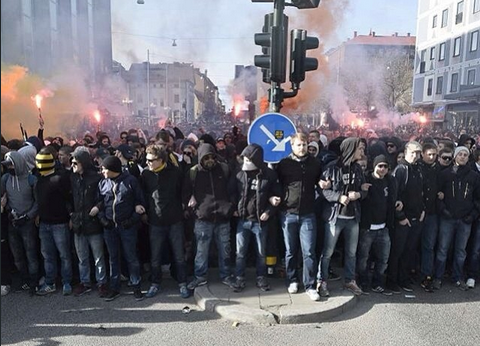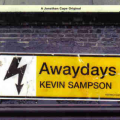Why Are So Many Football Fans Guilty Until Proven Innocent?
It's crazy that true fans can be banned from games just for drinking in the wrong pub...

Why Are So Many Football Fans Guilty Until Proven Innocent?
If you’ve ever been to a football match and stopped for a pint in a pub in which some other people were drinking who, on another occasion, and unknown to you, were once involved in trouble at the game, you may be classed by the police as a ‘risk’ supporter.
If this sounds far-fetched, Tony McManus will tell you it isn’t. Tony’s a Middlesbrough fan who was stopped by police at the airport on his way to the 2010 World Cup. Tony and his mate were told the police had intelligence that they were ‘risk’ supporters – meaning the police thought they were likely to get involved in violence. The police held them in custody for several hours and also applied for a banning order preventing Tony and his mate from attending football matches.
Tony was told he should just agree to the banning order as it would cost a lot of money to fight. He got himself a lawyer and fought the case. It turned out the police intelligence was based on CCTV footage from 2002 that showed Tony leaving a pub in Tottenham known to be frequented by Middlesbrough hooligans.
After repeated adjournments, the case was dropped. The police didn’t have enough evidence. But Tony and his mate didn’t get to the World Cup, and couldn’t get their money refunded. Tony brought a legal action against the police. Such cases are usually heard by a jury. But the police argued the case was about a technical legal issue of whether they had acted “reasonably”, so a judge should decide. The judge agreed, and dropped strong hints that he thought the police had acted reasonably. Tony and his lawyers thought this meant their chances of success were low. So the insurance company backing Tony’s case pulled the plug. He was forced to drop his case.
Think about this. A man was prevented from travelling, locked up and charged – not because of something he had done, but because of something the police thought he might do, based on things that other people he had been in the same place with had once done. And the legal system thinks this is “reasonable.” Not only that, it does not question the sinister fact that police are keeping detailed records of the innocent activities of football fans for years, which they can summon up at will.
This is just one example of a number of cases involving football fans that make solicitors, barristers and caseworkers who represent those fans believe there is a two-tier legal system in operation in this country. One for football fans, and one for everyone else.
The Football Supporters Federation has dealt with a number of cases in the last 18 months alone that back this theory. Caseworker Amanda Jacks, whose excellent work in this area can be followed on Twitter at @FSF_Faircop, says she’s been told by fans that police have admitted that if their ‘offence’ was not related to football they would be on their way, perhaps with a caution or fixed penalty notice.
I’ve been told about a fan banned by his club when police contacted the club after failing to secure a conviction relating to an incident entirely unconnected with football; about groups of young fans being stopped and made to provide personal details on camera; of fans detained on civil matters who have their details sent to police and kept on file.
More… Street Stories: Dante Lauder Hawkins How Football Fans Are Forcing The EDL Out Of Stadiums
I’ve also been told about court cases where, when the defendant is found to be a football fan, this fact has been used by prosecutors to sway opinion and secure conviction – even when the offence is entirely unrelated to football matters.
Amanda Jacks says: “In every single case that we can assist with, if a fan is put before the courts a banning order will be applied for regardless of the offence or the offender’s history.” And what that means is that, in a stance that reverses the centuries-old basic principle of law in this country, those fans are not considered innocent until proven guilty, but guilty until proven innocent.
On top of this, the Crown Prosecution Service said, last August, that it would “continue to operate a robust prosecution policy for football-related offences” and that “there will be a presumption of prosecution whenever there is sufficient evidence to bring offenders before a court”. That means that other options, such as cautions or fixed penalties, are rejected. Instead, the significant step of prosecution is taken.
Being subjected to the full force of the legal process can be a shattering experience, especially for individuals of previous good character. And being subjected to bail conditions akin to a banning order when charged not only increases the psychological pressure, it also reduces the chances of individuals successfully arguing their innocence. Regardless of bail conditions, police automatically pass details to the fan’s home club who will then issue an automatic ban. If that fan is a season ticket holder they will not get a refund for games missed regardless of the outcome of the case. (Although Tottenham Hotspur is the exception to the rule, as the club will refund on a not guilty verdict)
Football fans, of course, are not the only section of society to argue they are unfairly treated by the legal system. But such is the continuing stigma attached to the game and its followers in some sections of society that this particular ingrained prejudice is not widely recognised.
Some may say that the behaviour of some fans means it is inevitable the police and authorities will regard them with suspicion. But since when has tarring every member of a group with the same brush because of the behaviour of a minority been right? And, when there is growing pressure to take legal action not just against criminal activity but against behaviour some people would like to define as ‘antisocial’ – a move likened in some quarters to attempts to social cleansing – where are we going with all this?
Some important questions to ask yourself, especially when the moral panic about World Cup football hooligans begins to build up in the popular press.
Martin Cloake is a journalist and author who writes about football, the football business and football culture when he’s not doing the day job writing about other stuff. That other stuff has included finance, politics, music, celebrity and real life stories – and fruit and veg. His most challenging commission was delivering a 5,000-word epic on potatoes. Sadly, this is no longer available. But his books, in ebook and paperback form, plus some rather handsome hardbacks, are available direct from his website.
If you like it, Pass it on
 COMMENTS
COMMENTS
Martin - interesting article, 25 years too late! this is the price football supporters pay so armchair fans can sit end enjoy the wonder that is Sky. look closely and you will see Travel Bans are more liberally applied than some of our Anti Terrorism laws. We of a certain age why these laws were introduced and also know they have been abused ever since!
Interesting article. Interesting too that no such concerns would ever trouble followers of rugby, cricket or any other team sport that attracts travelling fans.
"A pub in Tottenham, known to be frequented by Middlesbrough hooligans" Somebody made that bit up.
It's a class issue, simple as.
Coppers tell whoppers. End of.
Have to say Amanda at the FSF is absolutely brilliant. Incredibly helpful if you find yourself in trouble in regards to football.
This strikes a chord with me. I was one of 25 people arrested and released - without charge, three days later - after police rounded up everyone English mug in the area, following a fight over a sandwich, in a bar most of us didn't even go to. My police record, I recently discovered, says I spent a year in prison for a violent offence. When I started the process of getting this lie removed from my record, the police officer at my local station said, "Yeah, but I bet you did something didn't you?" She wasn't there. It hapened before she was born. She's never met me before. It was several decades ago. In another country. But she knows I'm guilty!


 RELATED
RELATED






 SABOTAGE
SABOTAGE




